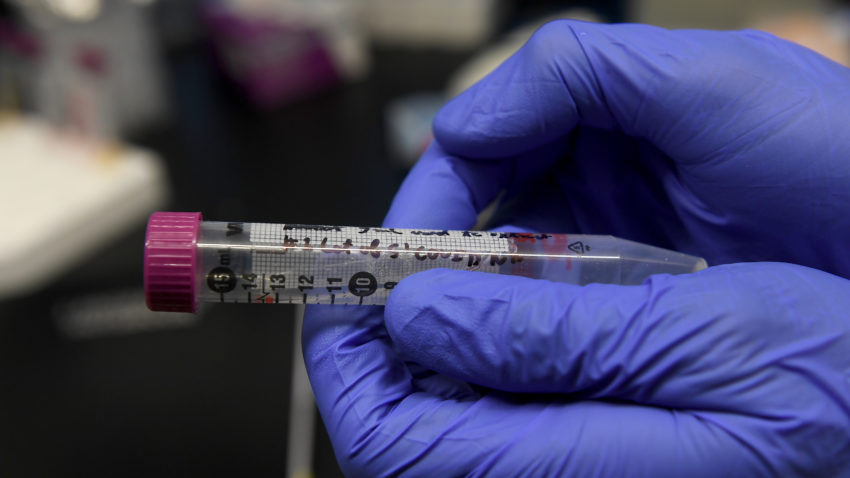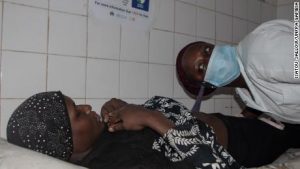Kim Bertelli-Hunt, 57, a Pittsfield Police detective, and her husband Steven Hunt, 61, a fellow police officer, both tested positive for the coronavirus in March. Neither were hospitalized. After they recovered, the pair have donated their plasma, which contains COVID-19 antibodies that may help others fight the virus.
Boston.com recently spoke with Bertelli-Hunt, 57, and Hunt, 61, about what it was like to have mild symptoms, the process for donating plasma, and why they’re urging others who can donate to do the same.
This interview has been edited for clarity and grammar.
What is it like having the coronavirus?
Steven Hunt: Every spring I get either pneumonia or bronchitis. I was really sick. I was having migraines from coughing so hard; I felt like I had rib injuries; I was having fevers. A few nights I couldn’t even lay down because I couldn’t breathe. We have a recliner couch, so I would sleep on that. If I went up or down the stairs, I had to sit down to catch my breath. I thought it was just a really bad seasonal thing. But then one night I was blowing my nose and blood was coming out.
I went to the clinic, they did a chest X-ray and they diagnosed [me with] bronchitis. They gave me antibiotics, so I was taking that for 10 days, and I slowly got better. I would say I was probably sick for about three weeks.
Kim Bertelli-Hunt: I normally get bronchitis every year because of my asthma, and when Steve started to feel a little better, I started coming down with a cough. It was weird because all of a sudden, I’m not tasting or smelling anything. I thought it was weird like, ‘Why am I not smelling the candles? Why am I not tasting my food?’ At that point, I didn’t know that was one of the [coronavirus] symptoms so I had gone to urgent care on March 22. They did a chest X-ray, and they just said my lungs were clear, that I had a major respiratory infection, and that if it got any worse I needed to go to the emergency room. They put me on antibiotics and a steroid and told me to increase my inhalers.
I was getting short of breath going up the stairs carrying a laundry basket. I thought it was my bronchitis and I was just out of shape. I started to feel better, but both of us had the cough for going on a month now.
Four other people in our department tested positive as well. One had no respiratory [symptoms], just had a fever. Another one was bedridden. It’s just weird. We went and got tested [on March 26], I really was not expecting to come back as positive.
What is the process for donating plasma?
Bertelli-Hunt: We got a letter from our local hospital for people to come and donate their plasma.
Hunt: I went [with another lieutenant] to get tested [again] so we could donate plasma. We went right in to the blood lab and probably weren’t there for a half hour. They took the blood. They had to do a test in each nostril.
I got home and they were supposed to be calling me with a match so I could donate blood for the antibodies, but they told me I had tested positive [for the coronavirus] again. They told me the tests can’t tell the difference between live cells and dead cells. I was told to continue social distancing, and I’d be eligible to go donate plasma [after two weeks].
[After two weeks, Kim and I] went to Walmart, to the bloodmobile. We got there for 8:30 a.m. and we were out of there by 9:30. It was a nice experience, we both got our blood donor cards, and in the future we’re both going to try to donate every eight weeks. It felt good to finally donate blood and plasma.
What motivated you to donate plasma?
Bertelli-Hunt: If it can help and save one life to recover from this, the more power to you to be able to donate and do that. I think it’s been proven to help other people fight this, and there’s not a ton of people that have tested positive. They may have been sick, but we were lucky enough being first responders and in law enforcement that we had access to the test.
Were there any parts of the donation process that you found difficult?
Hunt: I was so excited to donate, and I was waiting for [the call], ‘You got a match, come on over and give.’ Then I found out I had to wait two weeks — that was a real kick in the stomach. They can’t tell. If you test positive, they can’t tell whether they’re dead cells from when you had it before.
Would you encourage others who have recovered to donate plasma?
Bertelli-Hunt: If people have recovered from it and are lucky enough to be home with their loved ones, why not go donate your blood to help someone else get off a ventilator? Use your antibodies to fight this virus, so they can get home to their loved ones as well.
Get Boston.com’s e-mail alerts:
Sign up and receive coronavirus news and breaking
updates, from our newsroom to your inbox.
Sign up for Boston.com’s e-mail alerts and receive coronavirus news and breaking updates, from our newsroom to your inbox.
Thanks for signing up!



















